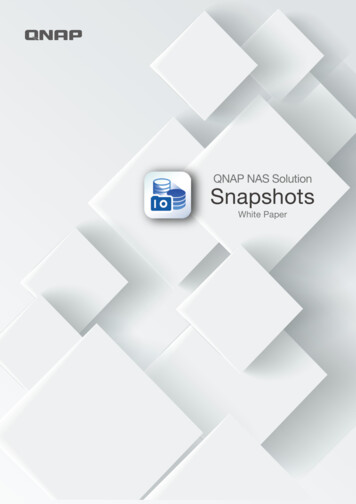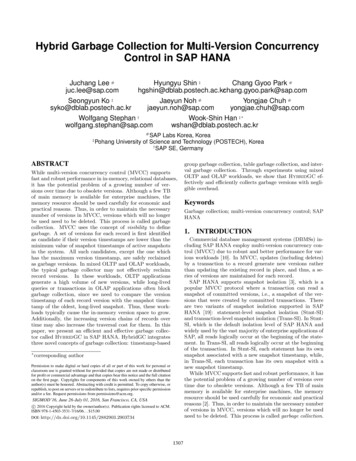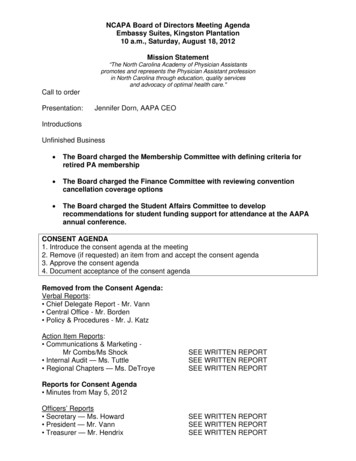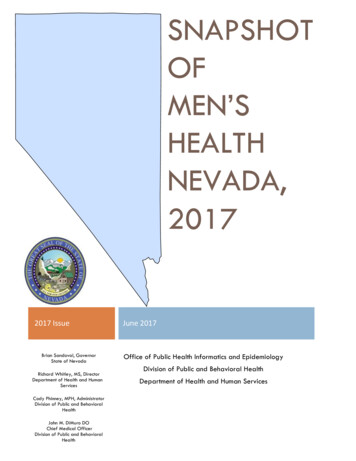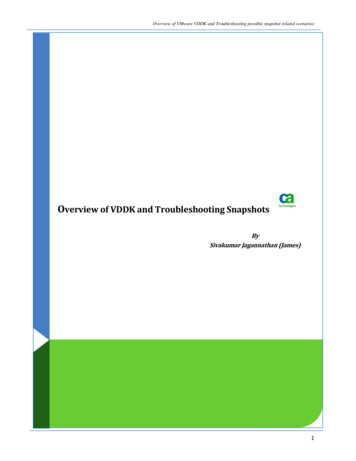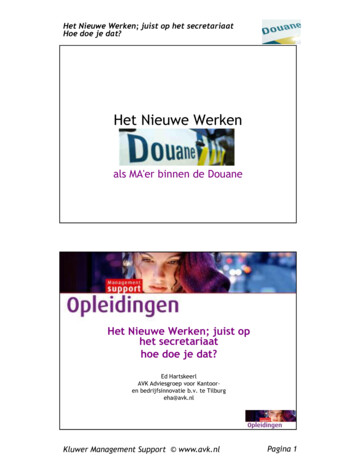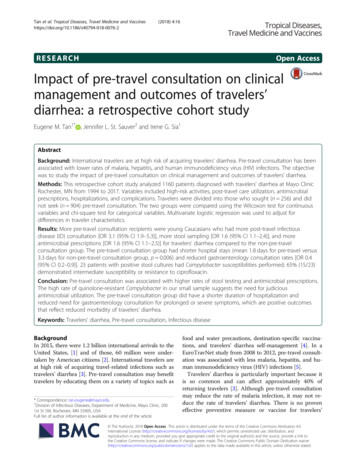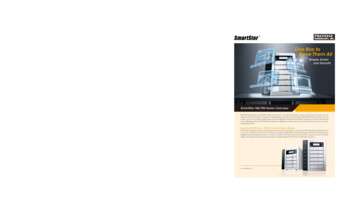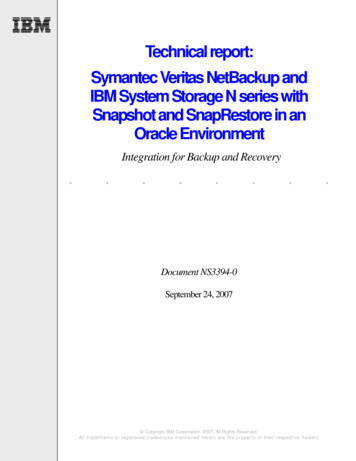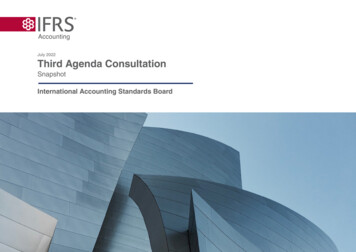
Transcription
July 2022Third Agenda ConsultationSnapshotInternational Accounting Standards Board
Foreword by Andreas Barckow, Chair of the IASB to prioritise responses to emerging issues,such as those related to intangibles, cash flows,climate and technology; and to maintain flexibility to respond to futureuncertainties, such as time-sensitive issues thatmay arise during the five-year cycle.Andreas BarckowChair of the IASBI am delighted to present the InternationalAccounting Standards Board’s (IASB) prioritiesfor 2022 to 2026. We identified these prioritiesthrough extensive stakeholder engagementand through analysis of feedback on our ThirdAgenda Consultation. Detailed information aboutthis consultation can be found in our feedbackstatement. This document provides the importanttakeaways.The ‘what’—prioritising the workConsistent with what our stakeholders told us,we plan: to advance ongoing priorities and work onprojects already on the IASB’s work plan,observing that we have the balance of ouractivities about right;The ‘when’—timing the workWe will first focus on work already under way, aswell as any time-sensitive work. This means thatwe may not make substantial progress on newprojects immediately. Moreover, although we planto start work on all identified new projects beforethe end of 2026, we do not expect to completeeverything, because some of those projects involvelonger-term considerations that extend past ourfive-yearly agenda consultation cycle.current asset and liability values). The ISSB’sIFRS Sustainability Disclosure Standards willrequire the disclosure of information aboutsustainability-related risks and opportunities, evenwhen these risks and opportunities relate to itemsthat are unrecognised or not disclosed in thefinancial statements. We will work with the ISSBto ensure that the two sets of Standards (IFRSStandards) complement each other to provideinvestors with a connected financial reportingpackage to meet their information needs.We appreciate your expertise, your time and yourthoughtful contributions to our work. We lookforward to continuing to work with you to improvefinancial reporting, support the capital markets andserve the public interest.The ‘how’—working with the InternationalSustainability Standards Board (ISSB)Our stakeholders sent us a strong messageabout the need to work together with our newlycreated sister board, the ISSB. The IASB’sIFRS Accounting Standards (Accounting Standards)provide investors with ‘monetary’ information infinancial statements about historical and currentmatters (including the effect of future matters onSnapshot—Third Agenda Consultation July 2022 2
IntroductionMissionThe IFRS Foundation’s mission is to developIFRS Standards that bring transparency,accountability and efficiency to financial marketsaround the world. Our work serves the publicinterest by fostering trust, growth and long-termfinancial stability in the global economy.The IASB aims to develop high-quality,understandable, enforceable and globally acceptedaccounting standards and it supports theirconsistent application.ActivitiesThe IASB pursues its mission through six main activities, with approximate levels of focus as illustratedin Diagram 1. IASB activities are integrated to some degree. However, the activities relating to theunderstandability and accessibility of Accounting Standards and to stakeholder engagement involve allaspects of the IASB’s work.Now that the ISSB has been created, the IASB’s activities will include some collaboration between thetwo boards. We expect that the four activities represented by the overlapping circles in Diagram 2 willbe most directly affected by our collaboration with the ISSB.Diagram 1—The IASB’shistorical activitiesDiagram 2—The IASB’s futureactivities (pages 4–9)IASBNew AccountingStandards and majoramendments to theAccounting Standards(40%–45%)New AccountingStandards and majoramendments to theAccounting StandardsMaintenance andconsistent application ofthe Accounting Standards(15%–20%)(5%)(5%)Maintenance andconsistent application ofthe Accounting StandardsThis overlap representspossible areas ofcollaboration betweenthe boards(20%–25%)Digital financialreportingIASBISSBThe IFRS for SMEsAccounting StandardDigital financialreportingThe IFRS for SMEsAccounting Standard(5%)Charts are not drawn to scaleSnapshot—Third Agenda Consultation July 2022 3
The IASB’s priorities for 2022 to 2026New Accounting Standards and major amendments to the Accounting StandardsObjectiveThe IASB: develops new Accounting Standards and major amendments to the Accounting Standards; and conducts post-implementation reviews (PIRs) of new Accounting Standards and major amendments.PrioritiesThe IASB plans: to continue to progress research and standard-setting projects on the IASB’s current work plan (see Appendix D to the Feedback Statement); to complete the required PIR of IFRS 9 Financial Instruments, to conduct the required PIRs of IFRS 15 Revenue from Contracts with Customers andIFRS 16 Leases, and to undertake possible priority follow-on projects if findings from these PIRs require further action; and to start new projects:- to review the accounting requirements for intangible assets;- to review the accounting requirements for the statement of cash flows and related matters; and- to respond to any time-sensitive issues that may arise after this agenda consultation.The IASB is also creating a reserve list of two projects that will be added to its work plan if additional capacity becomes available before its next five-yearlyagenda consultation. The projects on the reserve list are: Operating Segments; and Pollutant Pricing Mechanisms.The IASB plans to work with the ISSB on relevant projects—most likely, on the IASB’s current project on Management Commentary, its new research project onIntangible Assets and its reserve-list project on Pollutant Pricing Mechanisms.1 See next page for a new maintenance project on Climate-related Risks in theFinancial Statements.1The projects worked on with the ISSB and the timing of those projects will be informed by the ISSB’s own consultation on its agenda, which is planned to occur during 2022.Snapshot—Third Agenda Consultation July 2022 4
The IASB’s priorities for 2022 to 2026 continued .Maintenance and consistent application of the Accounting StandardsObjectiveThe IASB, together with the IFRS Interpretations Committee (Committee), maintains and supports the consistent application of the Accounting Standards as asingle set of high-quality global accounting standards.PrioritiesThe IASB, together with the Committee, plans: to continue:- to monitor the consistent application of the Accounting Standards;- to work on narrow-scope amendments to the Accounting Standards (maintenance projects—see Appendix D to the Feedback Statement);- to work on application questions submitted to the Committee, including by developing agenda decisions that improve consistency in the application of theAccounting Standards (see Appendix D to the Feedback Statement);- to provide educational and supporting materials such as webinars, webcasts and articles;- to use transition resource groups to support the implementation of new Accounting Standards, as needed; and- to support regulators and national standard-setters in their efforts to support consistent application of the Accounting Standards; and to start a new, narrow-scope project to determine whether and, if so, what further actions might be needed to improve the accounting for climate-related risksin the financial statements, after the publication of the IFRS Foundation’s educational material on the Effects of climate-related matters on financial statementsand application of the ISSB’s future IFRS Sustainability Disclosure Standard on climate-related disclosures. The IASB will coordinate any work on this topicwith the ISSB.Snapshot—Third Agenda Consultation July 2022 5
The IASB’s priorities for 2022 to 2026 continued .IFRS for SMEs Accounting StandardObjectiveThe IASB, assisted by its consultative SME Implementation Group (SMEIG), sets requirements and develops educational materials for companies withoutpublic accountability (SMEs).PrioritiesThe IASB, together with the SMEIG, plans: to complete the Second Comprehensive Review of the IFRS for SMEs Accounting Standard; and to publish educational materials to help preparers understand and apply the IFRS for SMEs Accounting Standard.Snapshot—Third Agenda Consultation July 2022 6
The IASB’s priorities for 2022 to 2026 continued .Digital financial reportingObjectiveTo facilitate the digital consumption of financial information.PrioritiesThe IASB will slightly increase its focus on this activity to help improve the usefulness, quality, accessibility and comparability of digital financial information.To do so, the IASB plans: to consider the implications of increased consumption of digital financial information for Accounting Standards, which have historically been based on howmuch information can be presented and disclosed in a paper-based or PDF-based format; to continue to improve the IFRS Accounting Taxonomy by, for example:- updating the IFRS Accounting Taxonomy to reflect new or amended requirements;- updating the IFRS Accounting Taxonomy to reflect information (not referred to explicitly in the Accounting Standards or the accompanying materials) that iscommonly disclosed in practice by companies when applying the Accounting Standards;- publishing educational materials to help companies, regulators and others who use the IFRS Accounting Taxonomy; and- identifying and resolving causes of errors and unnecessary extensions; to engage further with its partners in the digital ecosystem by, for example, working with regulators to support adoption of the IFRS Accounting Taxonomy andwith preparers to support quality outcomes in applying the IFRS Accounting Taxonomy; and to work with the ISSB, for example:- to develop consistent approaches and concepts for the IFRS Accounting Taxonomy and the to-be-developed IFRS Sustainability Disclosure Taxonomy;- to develop technological compatibility, so companies can seamlessly use both taxonomies; and- to engage jointly with the digital reporting ecosystem to facilitate the consumption of digital information.Snapshot—Third Agenda Consultation July 2022 7
The IASB’s priorities for 2022 to 2026 continued .Understandability and accessibility of Accounting StandardsObjectiveThe IASB seeks to improve the understandability and accessibility of its requirements.PrioritiesThe IASB plans to slightly increase its focus on this activity: to further improve the understandability of IASB requirements. It will also explore new ways to improve the understandability of Accounting Standards. TheIASB currently focuses on understandability by, for example:- drafting clear Accounting Standards; and- developing supporting materials such as snapshots, project summaries, feedback statements and articles written by IASB members; to explore new ways to further improve the accessibility of Accounting Standards and supporting materials, which could indirectly support maintenance andconsistent application of the Accounting Standards. The IASB currently focuses on accessibility by, for example, publishing:- Accounting Standards with annotations and cross-references to other materials; and- twice-yearly compilations of Committee agenda decisions; and to work with the ISSB, with possible areas of collaboration between the IASB and the ISSB to include:- drafting-related matters to ensure consistent drafting and terminology in the two sets of Standards; and- accessibility, for example, by using technology to improve accessibility and highlight connections between the two sets of Standards and related materials.Snapshot—Third Agenda Consultation July 2022 8
The IASB’s priorities for 2022 to 2026 continued .Stakeholder engagementObjectiveThe IASB engages with its stakeholders to support the development of its high-quality requirements and promote acceptance of the Accounting Standards.PrioritiesThe IASB plans: to continue general and project-specific meetings with stakeholders, including meetings with the IASB’s advisory bodies and consultative groups, externalevents and conferences, the IFRS Foundation annual conference and the World Standard-setters Conference; to continue to develop materials that support meetings with stakeholders and dedicated stakeholder content on the IFRS website; to continue to solicit and analyse comment letters received from stakeholders in response to formal consultation documents; to continue to use technology to broaden and deepen stakeholder engagement; and to find opportunities to coordinate with the ISSB, for example, to identify possible synergies such as opportunities for joint outreach meetings withstakeholders on activities pursued jointly and to avoid overloading stakeholders with multiple outreach meeting requests.Snapshot—Third Agenda Consultation July 2022 9
Copyright 2022 IFRS FoundationAll rights reserved. Reproduction and use rights are strictly limited. No part of this publication may be translated, reprinted, reproduced or used in any form either in whole or in part or by any electronic,mechanical or other means, now known or hereafter invented, including photocopying and recording, or in any information storage and retrieval system, without prior permission in writing from the IFRS Foundation.The Foundation has trade marks registered around the world including ‘IAS ,’ ‘IASB ,’ the IASB logo, ‘IFRIC ,’ ‘IFRS ,’ the IFRS logo, ‘IFRS for SMEs ,’ the IFRS for SMEs logo, the ‘Hexagon Device’,‘International Accounting Standards ,’ ‘International Financial Reporting Standards ,’ ‘NIIF ’ and ‘SIC .’ Further details of the Foundation’s trade marks are available from the Foundation on request.The IFRS Foundation is a not-for-profit corporation under the General Corporation Law of the State of Delaware, USA and operates in England and Wales as an overseas company(Company number: FC023235) with its principal office in London.
Columbus Building7 Westferry CircusCanary WharfLondon E14 4HD, UKTelEmail 44 (0) 20 7246 6410customerservices@ifrs.orgifrs.orgInternational Financial Reporting Standards , IFRS Foundation ,IFRS , IAS , IFRIC , SIC , IASB , ISSBTM, IFRS for SMEs Copyright 2022 IFRS Foundation
Intangible Assets and its reserve-list project on Pollutant Pricing Mechanisms.1 See next page for a new maintenance project on Climate-related Risks in the Financial Statements. 1 The projects worked on with the ISSB and the timing of those projects will be informed by the ISSB's own consultation on its agenda, which is planned to occur .
